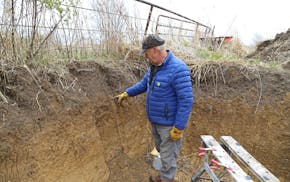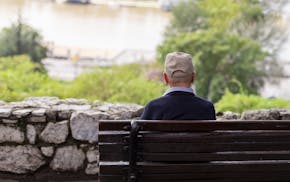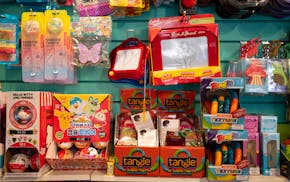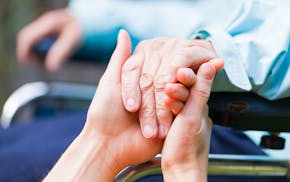Opinion editor's note: Strib Voices publishes a mix of guest commentaries online and in print each day. To contribute, click here.
•••
April 30 marked the 50th anniversary of the fall of Saigon, which signaled the end of the Vietnam War. It also marks 50 years of my family calling the United States home.
For my mom, her family's journey to the U.S. started 10 days before the fall of Saigon when they escaped on one of the massive C-130 cargo planes the Americans sent to help refugees. All 10 of my mom's brothers and sisters, along with grandma and grandpa, flew to Wake Island, which was used as an American processing center during the end of the war.
Each person was only allowed one personal bag and their birth certificates and no goodbye to loved ones they left behind. That includes my mom, who was stuck in a small village with my great-grandmother. She'd stay for another six years before she'd make it to the U.S., forced to work in the reeducation or labor camps the Communists set up for the country's young people. She still recalls being assigned farming work or work that consisted of standing in leech-infested waters for hours on end, but was thankful to have others in the camp willing to switch with her so she could spend time cooking in the kitchen.
She also vividly remembers times when she would run errands to the grocery store or pharmacy, and the businesses would be looted because people were so scared and unsure of the change happening as the Communist government rose to power.
As she watched her beloved country change, she was constantly wondering if the government would figure out who she was and whether she'd be punished, since my grandfather worked for the American forces during the war as a translator and chauffeur.
As for the rest of the family, they would spend three months at Fort Chaffee in Arkansas. My aunts and uncles still remember waiting in long lines for food and how the rice was subpar, so they volunteered to cook to make sure it was right. This was also where they'd learn English and study American culture as they waited for a sponsor. They had offers, but none were willing to take in a dozen people all at once and they didn't want to be separated, so they waited.
Then First Baptist Church in Owego, New York, agreed to welcome all 12 in August 1975. It was big news for the small town. My grandpa and the family even made the local paper.
Meanwhile, my dad was in the South Vietnamese Navy during the war, fighting alongside the Americans. He was on his navy ship at the time of the fall, and the captain gave orders to sail out into the ocean for safety. After they realized South Vietnam had fallen to the Communists, they knew they couldn't go back even for just a moment to say goodbye to family and friends. They just had to make a run for it.
They sailed to Subic Bay, a U.S. Navy base in the Philippines where they'd switch to an American ship and set sail for Guam. They weren't the only ones — the front pages of the local newspapers captured the steady influx of refugees coming to the small island in the days and years following the fall.
My dad would stay in Guam for 25 days. From there, he'd fly to Pennsylvania's Fort Indiantown Gap. A couple of weeks later, news of a sponsor in Connecticut.
My dad was alone in a new land, unfamiliar with the culture and the language and with barely any money to his name. He had to leave both of his parents and six brothers and sisters behind in Vietnam.
For four years, his family didn't know if he was dead or alive. That's how long it took for my dad to work up the courage to contact his family by mail. He was too afraid his letters might get intercepted by the Communist government and his family would pay the price for his escape.
About two months after his first letter, my grandfather — his father — died from a stroke. My dad wouldn't be able to make it home for the funeral.
It would be another decade before Vietnam would reopen for international travel.
Looking back on their stories, I am truly humbled and in awe of their journeys to the United States. It is not lost on me that I would not be where I am today if it weren't for my family's courage, sacrifice and bravery. I'm so proud to say this is my family and to be able to carry on our legacy.
Pauleen Le is a reporter and anchor for WCCO-TV and is originally from Eagan. Her documentary "Vietnam 50 Years Later: Reflection on a War that Changed Minnesota" is available at cbsnews.com/minnesota/vietnam.

Burcum: A pair of 'big muddy boots to fill'
Opinion: 50 years after the fall of Saigon: A family's journey from Vietnam to the U.S.

Opinion: Federal lawmakers are failing older Minnesotans

Readers Write: Tariffs and the economy, Target, public health, Vietnam War

